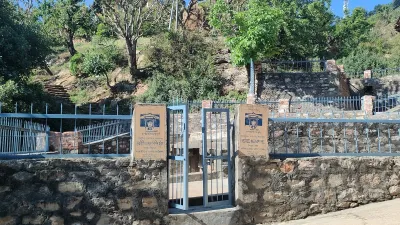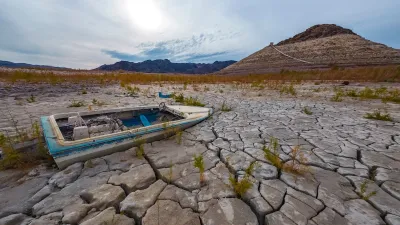The world is facing a water crisis, and existing development and management practices are only making it worse. This interview with water expert Peter Gleick looks at what's being done wrong and how it can be done right.
"A report from the World Economic Forum warned that in only twenty years our civilization may be facing "water bankruptcy"--shortfalls of fresh water so large and pervasive that global food production could crater, meaning that we'd lose the equivalent of the entire grain production of the US and India combined."
"The Nation: One of your points on the soft path is about matching the quality of water with its use so that we are no longer flushing our toilets or watering our lawns with potable water. How can we begin to make this transition?
Peter Gleick: We are making it. The places that are really water scarce are making that transition faster than other places. Water re-use has been going on for many years in Namibia. Singapore is moving very aggressively to something called NEWater, which is a state-of-the-art water treatment that is not used for direct potable re-use right away but for other demands for water. We can treat any quality water to potable standards. We have the technology. There is a psychological barrier and an education barrier and an expense barrier, but we are seeing it more and more. Another barrier is that we have one set of pipes that come into our homes. We don't need potable water for flushing our toilets, but often that is the only water we have. So part of the challenge is changing our infrastructure, so we can use different qualities of water for different purposes. That takes investment: money, time and education.
The Nation: So who should be doing this? Cities? States?
Peter Gleick: In general, we want our water to be managed and regulated at the lowest possible level: the most local. We want communities making decisions about water management, where appropriate. But there are things we want at the federal level--like efficiency standards and water-quality standards. One of the key points of the soft path is to manage water at the proper level."
FULL STORY: A World Without Water

Alabama: Trump Terminates Settlements for Black Communities Harmed By Raw Sewage
Trump deemed the landmark civil rights agreement “illegal DEI and environmental justice policy.”

Study: Maui’s Plan to Convert Vacation Rentals to Long-Term Housing Could Cause Nearly $1 Billion Economic Loss
The plan would reduce visitor accommodation by 25% resulting in 1,900 jobs lost.

Planetizen Federal Action Tracker
A weekly monitor of how Trump’s orders and actions are impacting planners and planning in America.

Waymo Gets Permission to Map SF’s Market Street
If allowed to operate on the traffic-restricted street, Waymo’s autonomous taxis would have a leg up over ride-hailing competitors — and counter the city’s efforts to grow bike and pedestrian on the thoroughfare.

Parklet Symposium Highlights the Success of Shared Spaces
Parklets got a boost during the Covid-19 pandemic, when the concept was translated to outdoor dining programs that offered restaurants a lifeline during the shutdown.

Federal Homelessness Agency Places Entire Staff on Leave
The U.S. Interagency Council on Homelessness is the only federal agency dedicated to preventing and ending homelessness.
Urban Design for Planners 1: Software Tools
This six-course series explores essential urban design concepts using open source software and equips planners with the tools they need to participate fully in the urban design process.
Planning for Universal Design
Learn the tools for implementing Universal Design in planning regulations.
Caltrans
Smith Gee Studio
Institute for Housing and Urban Development Studies (IHS)
City of Grandview
Harvard GSD Executive Education
Toledo-Lucas County Plan Commissions
Salt Lake City
NYU Wagner Graduate School of Public Service





























